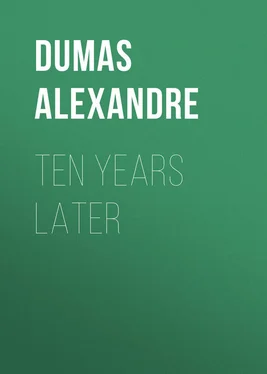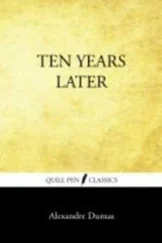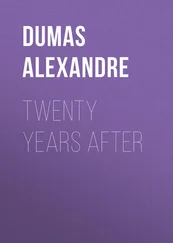Alexandre Dumas - Ten Years Later
Здесь есть возможность читать онлайн «Alexandre Dumas - Ten Years Later» — ознакомительный отрывок электронной книги совершенно бесплатно, а после прочтения отрывка купить полную версию. В некоторых случаях можно слушать аудио, скачать через торрент в формате fb2 и присутствует краткое содержание. Жанр: literature_19, foreign_antique, foreign_prose, на английском языке. Описание произведения, (предисловие) а так же отзывы посетителей доступны на портале библиотеки ЛибКат.
- Название:Ten Years Later
- Автор:
- Жанр:
- Год:неизвестен
- ISBN:нет данных
- Рейтинг книги:4 / 5. Голосов: 1
-
Избранное:Добавить в избранное
- Отзывы:
-
Ваша оценка:
- 80
- 1
- 2
- 3
- 4
- 5
Ten Years Later: краткое содержание, описание и аннотация
Предлагаем к чтению аннотацию, описание, краткое содержание или предисловие (зависит от того, что написал сам автор книги «Ten Years Later»). Если вы не нашли необходимую информацию о книге — напишите в комментариях, мы постараемся отыскать её.
Ten Years Later — читать онлайн ознакомительный отрывок
Ниже представлен текст книги, разбитый по страницам. Система сохранения места последней прочитанной страницы, позволяет с удобством читать онлайн бесплатно книгу «Ten Years Later», без необходимости каждый раз заново искать на чём Вы остановились. Поставьте закладку, и сможете в любой момент перейти на страницу, на которой закончили чтение.
Интервал:
Закладка:
Raoul, with the air of one who neither seeks nor fears a quarrel, bowed his head in token of assent, and seated himself upon a bench in the sun. “That is well,” said De Guiche, “remain where you are, Raoul, and tell them to show you the two horses I have just purchased; you will give me your opinion, for I only bought them on condition that you ratified the purchase. By the by, I have to beg your pardon for having omitted to inquire after the Comte de la Fere.” While pronouncing these latter words, he closely observed De Wardes, in order to perceive what effect the name of Raoul’s father would produce upon him. “I thank you,” answered the young man, “the count is very well.” A gleam of deep hatred passed into De Wardes’s eyes. De Guiche, who appeared not to notice the foreboding expression, went up to Raoul, and grasping him by the hand, said, – “It is agreed, then, Bragelonne, is it not, that you will rejoin us in the courtyard of the Palais Royal?” He then signed to De Wardes to follow him, who had been engaged in balancing himself first on one foot, then on the other. “We are going,” said he, “come, M. Malicorne.” This name made Raoul start; for it seemed that he had already heard it pronounced before, but he could not remember on what occasion. While trying to recall it half-dreamily, yet half-irritated at his conversation with De Wardes, the three young men set out on their way towards the Palais Royal, where Monsieur was residing. Malicorne learned two things; the first, that the young men had something to say to each other; and the second, that he ought not to walk in the same line with them; and therefore he walked behind. “Are you mad?” said De Guiche to his companion, as soon as they had left the Hotel de Grammont; “you attack M. d’Artagnan, and that, too, before Raoul.”
“Well,” said De Wardes, “what then?”
“What do you mean by ‘what then?’”
“Certainly, is there any prohibition against attacking M. d’Artagnan?”
“But you know very well that M. d’Artagnan was one of those celebrated and terrible four men who were called the musketeers.”
“That they may be; but I do not perceive why, on that account, I should be forbidden to hate M. d’Artagnan.”
“What cause has he given you?”
“Me! personally, none.”
“Why hate him, therefore?”
“Ask my dead father that question.”
“Really, my dear De Wardes, you surprise me. M. d’Artagnan is not one to leave unsettled any enmity he may have to arrange, without completely clearing his account. Your father, I have heard, carried matters with a high hand. Moreover, there are no enmities so bitter that they cannot be washed away by blood, by a good sword-thrust loyally given.”
“Listen to me, my dear De Guiche, this inveterate dislike existed between my father and M. d’Artagnan, and when I was quite a child, he acquainted me with the reason for it, and, as forming part of my inheritance, I regard it as a particular legacy bestowed upon me.”
“And does this hatred concern M. d’Artagnan alone?”
“As for that, M. d’Artagnan was so intimately associated with his three friends, that some portion of the full measure of my hatred falls to their lot, and that hatred is of such a nature, whenever the opportunity occurs, they shall have no occasion to complain of their allowance.”
De Guiche had kept his eyes fixed on De Wardes, and shuddered at the bitter manner in which the young man smiled. Something like a presentiment flashed across his mind; he knew that the time had passed away for grands coups entre gentilshommes ; but that the feeling of hatred treasured up in the mind, instead of being diffused abroad, was still hatred all the same; that a smile was sometimes as full of meaning as a threat; and, in a word, that to the fathers who had hated with their hearts and fought with their arms, would now succeed the sons, who would indeed hate with their hearts, but would no longer combat their enemies save by means of intrigue or treachery. As, therefore, it certainly was not Raoul whom he could suspect either of intrigue or treachery, it was on Raoul’s account that De Guiche trembled. However, while these gloomy forebodings cast a shade of anxiety over De Guiche’s countenance, De Wardes had resumed the entire mastery over himself.
“At all events,” he observed, “I have no personal ill-will towards M. de Bragelonne; I do not know him even.”
“In any case,” said De Guiche, with a certain amount of severity in his tone of voice, “do not forget one circumstance, that Raoul is my most intimate friend;” a remark at which De Wardes bowed.
The conversation terminated there, although De Guiche tried his utmost to draw out his secret from him; but, doubtless, De Wardes had determined to say nothing further, and he remained impenetrable. De Guiche therefore promised himself a more satisfactory result with Raoul. In the meantime they had reached the Palais Royal, which was surrounded by a crowd of lookers-on. The household belonging to Monsieur awaited his command to mount their horses, in order to form part of the escort of the ambassadors, to whom had been intrusted the care of bringing the young princess to Paris. The brilliant display of horses, arms, and rich liveries, afforded some compensation in those times, thanks to the kindly feelings of the people, and to the traditions of deep devotion to their sovereigns, for the enormous expenses charged upon the taxes. Mazarin had said: “Let them sing, provided they pay;” while Louis XIV.‘s remark was, “Let them look.” Sight had replaced the voice; the people could still look but they were no longer allowed to sing. De Guiche left De Wardes and Malicorne at the bottom of the grand staircase, while he himself, who shared the favor and good graces of Monsieur with the Chevalier de Lorraine, who always smiled at him most affectionately, though he could not endure him, went straight to the prince’s apartments, whom he found engaged in admiring himself in the glass, and rouging his face. In a corner of the cabinet, the Chevalier de Lorraine was extended full length upon some cushions, having just had his long hair curled, with which he was playing in the same manner a woman would have done. The prince turned round as the count entered, and perceiving who it was, said: “Ah! is that you, De Guiche; come here and tell me the truth.”
“You know, my lord, it is one of my defects to speak the truth.”
“You will hardly believe, De Guiche, how that wicked chevalier has annoyed me.”
The chevalier shrugged his shoulders.
“Why, he pretends,” continued the prince, “that Mademoiselle Henrietta is better looking as a woman than I am as a man.”
“Do not forget, my lord,” said De Guiche, frowning slightly, “you require me to speak the truth.”
“Certainly,” said the prince, tremblingly.
“Well, and I shall tell it you.”
“Do not be in a hurry, Guiche,” exclaimed the prince, “you have plenty of time; look at me attentively, and try to recollect Madame. Besides, her portrait is here. Look at it.” And he held out to him a miniature of the finest possible execution. De Guiche took it, and looked at it for a long time attentively.
“Upon my honor, my lord, this is indeed a most lovely face.”
“But look at me, count, look at me,” said the prince, endeavoring to direct upon himself the attention of the count, who was completely absorbed in contemplation of the portrait.
“It is wonderful,” murmured Guiche.
“Really one would imagine you had never seen the young lady before.”
“It is true, my lord, I have seen her but it was five years ago; there is a great difference between a child twelve years old, and a girl of seventeen.”
Читать дальшеИнтервал:
Закладка:
Похожие книги на «Ten Years Later»
Представляем Вашему вниманию похожие книги на «Ten Years Later» списком для выбора. Мы отобрали схожую по названию и смыслу литературу в надежде предоставить читателям больше вариантов отыскать новые, интересные, ещё непрочитанные произведения.
Обсуждение, отзывы о книге «Ten Years Later» и просто собственные мнения читателей. Оставьте ваши комментарии, напишите, что Вы думаете о произведении, его смысле или главных героях. Укажите что конкретно понравилось, а что нет, и почему Вы так считаете.












